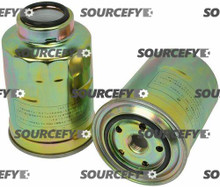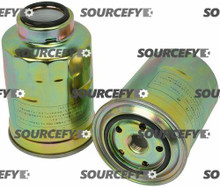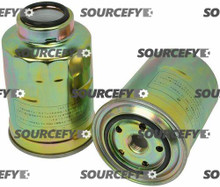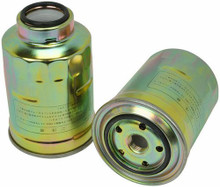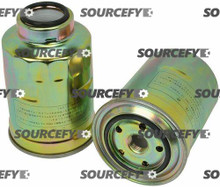- Home
- Forklift Parts
- Filters
- Fuel
- Aftermarket Replacement FUEL FILTER 23303-64010 for Nissan, Toyota
Aftermarket Replacement Fuel Filter 23303-64010 for Nissan, Toyota
Category: Fuel Filter
Product Description
The 23303-64010 fuel filter is an aftermarket replacement designed for industrial machines, especially those from Toyota and Nissan. Its primary function is to protect the engine by filtering out harmful particles and contaminants from the fuel. Clean fuel is crucial for keeping the engine running smoothly and efficiently, as even small debris can cause significant wear over time.
A well-maintained fuel filter 23303-64010 for Toyota and Nissan ensures that only clean fuel reaches the engine, reducing the risk of damage to components like injectors and fuel pumps. Over time, dirty fuel filters can lead to poor engine performance, reduced fuel efficiency, or even costly repairs.
Regular replacement of the fuel filter helps maintain optimal engine performance and longevity. Replacing the filter according to the manufacturer's guidelines ensures your machine stays in top condition.
Product Specifications
|
Part Type |
Fuel Filter |
|
Model Number |
23303-64010 |
| Make | Nissan and Toyota |
| Condition | New |
| Filteration Technology | Multi-layer filtration |
Aftermarket Replacement Fuel Filter 23303-64010 for Nissan, Toyota
Features
The 23303-64010 fuel filter offers advanced performance and protection for industrial engines, specifically for Toyota and Nissan machinery.
-
Precision Filtration Technology: Utilizes multi-layer filtration to capture even microscopic contaminants.
-
Durable Construction: Built with high-grade materials to resist wear and maintain long-lasting performance.
-
High Flow Rate: Designed to ensure a steady fuel supply without compromising filtration efficiency.
-
OEM Compatibility: Engineered to meet or exceed the original equipment manufacturer’s standards for optimal performance.
Benefits
This fuel filter enhances engine health and efficiency, offering tangible advantages for industrial applications.
-
Improved Engine Performance: Cleaner fuel leads to smoother engine operations and reduced risk of clogs.
-
Extended Engine Lifespan: Minimizes wear on engine parts by preventing contaminants from entering the fuel system.
-
Enhanced Fuel Efficiency: Keeps fuel flow optimal, improving overall machine efficiency during operation.
-
Reduced Maintenance Needs: Fewer impurities entering the engine mean less frequent repairs and maintenance requirements.
Symptoms of a Faulty Fuel Filter
A failing fuel filter can lead to noticeable engine performance issues. Recognizing the signs early can prevent costly repairs.
-
Engine Misfires: Frequent engine misfires can occur when the fuel filter is clogged, restricting proper fuel flow.
-
Loss of Power: The engine may experience reduced power, especially during acceleration or while driving uphill.
-
Hard Starting: A clogged filter makes it harder for fuel to reach the engine, making it difficult to start the machine.
-
Rough Idling: A faulty fuel filter can cause uneven fuel delivery, resulting in the engine running roughly at idle.
-
Decreased Fuel Efficiency: A blocked filter forces the engine to work harder, reducing fuel efficiency and performance.
Recommended Use/Applications
-
Toyota and Nissan: Ideal for industrial Toyota and Nissan machinery fuel systems.
-
Forklifts: Perfect for forklifts in high-demand industrial environments.
-
Fuel Filtration: Designed for heavy-duty equipment requiring reliable fuel filtration.
Frequently Asked Questions
What happens if I replace the fuel filter sparingly?
If the fuel filter isn't replaced on time, it can lead to clogged injectors, poor engine performance, and potential damage to the fuel system. This could result in expensive repairs or replacements.
How often should the fuel filter be replaced?
It's recommended to replace it according to the manufacturer's guidelines, typically after every 20,000 to 40,000 miles, depending on the operating conditions and fuel quality.
Can a faulty fuel filter cause engine stalling?
A clogged or faulty filter can restrict fuel flow, causing the engine to stall, especially during acceleration or under heavy loads.
Does a dirty fuel filter affect fuel efficiency?
Yes, a dirty fuel filter forces the engine to work harder, reducing fuel efficiency and leading to higher fuel consumption.
How do I know if my fuel filter needs replacement?
Common signs include hard starting, rough idling, engine misfires, and reduced power during acceleration.
 Loading... Please wait...
Loading... Please wait...








